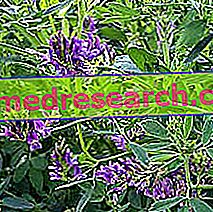
Scientific name
Medicago sativa
Family
Leguminosae
Origin
Plant grown everywhere, mainly as fodder
Synonyms
Alfalfa or Alfaalfa
Used Parts
Drug consisting of leaves
Chemical constituents
- Saponins (medicagenic acid and ederagenin);
- Soluble and insoluble fibers;
- Phytoestrogens (cumestrol);
- Vitamins (B, E, D, provitamin A, K);
- Pigments with antioxidant activity;
- Mineral salts.
Alfalfa in Herbalist: Properties of the Alfalfa
Alfalfa, cultivated in agriculture as a forage for livestock, is considered a valid restorative remedy. It is taken as a source of vitamins and minerals or as a preventive supplement on some phenomena of cancerous degeneration of intestinal cells. Much used during convalescence, appetite and hepato-biliary functions are attributed to alfalfa.
The infusion and the non-titrated hydro-alcoholic extracts in active ingredients are not recommended.
For external use, alfalfa is used for its nourishing, elasticizing and emollient dermofunctional properties.
Biological activity
As mentioned, alfalfa is used above all for its high content of vitamins and minerals, even if interesting properties are attributed to this plant.
In fact, it seems that the saponins contained in alfalfa have potential therapeutic activities.
An interesting study conducted on the aforementioned saponins, has shown how these molecules are able to bind to bile acids, thus interfering with the absorption of cholesterol and thus exerting a cholesterol-lowering action.
However, it is believed that the lipid-lowering action is not to be ascribed exclusively to saponins, but also to other molecules present within the plant. In fact, from studies conducted on humans, it emerged that the intake of alfalfa-based preparations generates a moderate reduction in blood cholesterol levels, while the intake of only saponins extracted from the plant does not influence cholesterolemia in any way.
Another study conducted on animals, however, showed that alfalfa has hypoglycemic action in diabetic rats, while it does not affect blood glucose levels in healthy rats.
Finally, alfalfa has also been shown to have antifungal properties, always attributable to the saponins it contains.
However, despite the results obtained so far, at the moment the use of alfalfa has not obtained official approval for any type of therapeutic application.
Alfalfa in folk medicine and homeopathy
In folk medicine, alfalfa is used as a remedy to treat diseases such as diabetes and malfunctions of the thyroid gland.
Alfalfa is also used in the homeopathic field, where it can be found in the form of mother tincture, granules and drops.
Homeopathic medicine generally uses this plant in case of physical fatigue, tiredness, weakness and lack of appetite; in addition to using it as a remedy to promote the production of breast milk after childbirth and as a remedy to counter the symptoms of menopause.
The dose of product to be taken can vary between one individual and another, also depending on the type of disorder that must be treated and according to the type of preparation and homeopathic dilution that one wants to use.
Side effects
These extracts have few adverse effects, although a lupoid canavanine syndrome, an amino acid constituent of alfalfa, has been described.
Furthermore, cases of gastrointestinal disorders, hypokalaemia and infections with Escherichia coli and Salmonella have also been reported following the use of alfalfa and its preparations.
Contraindications
Avoid the use of alfalfa in case of hypersensitivity to one or more components and in patients with gout and / or systemic lupus erythematosus.
Warnings
When using a fiber-based extract, care must be taken not to take other drugs at the same time, due to the possible reduction in drug absorption. Attention to the estrogenic activity of alfalfa, which varies with its growth: it is maximum in April-May and nothing in July.
Pharmacological Interactions
Drug interactions can occur between alfalfa extracts and:
- Azathioprine and cyclosporine, since alfalfa can decrease the immunosuppressive activity of these drugs;
- Prednisone, since the plant can reduce its effectiveness;
- Oral anticoagulants, because, due to its vitamin K content, alfalfa can reduce the effectiveness of these drugs;
- Antidiabetic;
- Hormonal therapies (tamoxifen).



